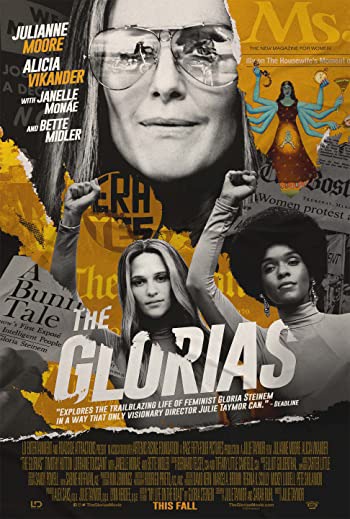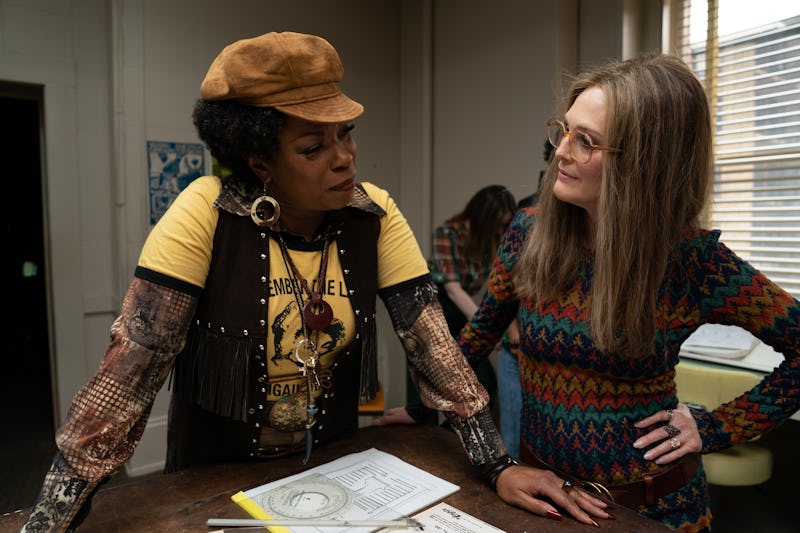The Glorias เดอะ กลอเรียส (2020) [พากย์ไทย บรรยายไทย]


หมวดหมู่ : หนังดราม่า , หนังชีวประวัติ , หนังประวัติศาสตร์
เรื่องย่อ : The Glorias เดอะ กลอเรียส (2020) [พากย์ไทย บรรยายไทย]
ชื่อภาพยนตร์ : The Glorias เดอะ กลอเรียส
แนว/ประเภท : Biography, Drama, History
ผู้กำกับภาพยนตร์ : Julie Taymor
บทภาพยนตร์ : Julie Taymor, Sarah Ruhl
นักแสดง : Julianne Moore, Alicia Vikander, Janelle Monáe
วันที่ออกฉาย : 30 September 2020
เรื่องราวของ ไอคอนสตรี ที่กำลังเป็นที่นิยมในตอนเป็นเด็กของ กลอเรีย สเตเนม และเรื่องของอิทธิพลที่มีผลต่อการดำเนินชีวิตของเธอ ในบทบาทของผู้ที่เป็นทั้ง นักเขียน นักขับเคลื่อน และนักจัดรายการ ที่เกี่ยวกับเรื่องของการออกมาเรียกร้องสิทธิต่างๆ ให้กับเหล่าสตรีทุกคนจากทั่วทั้งโลก

IMDB : tt7435316
คะแนน : 5.3
รับชม : 812 ครั้ง
เล่น : 75 ครั้ง
Julie Taymor directs Julianne Moore and Alicia Vikander in this sprawling bio-drama about trailblazing women's rights movement leader Gloria Steinem.

Covering 80 years in the life and work of one of the key figures of the American feminist movement, whose influence has stretched across generations, Julie Taymor's nontraditional biopic The Glorias certainly can't be faulted for lack of ambition. But sometimes breadth comes at the expense of intimacy, which factors only intermittently in this deeply admiring but frustratingly choppy encapsulation of the legacy of Gloria Steinem. Threaded throughout with stylistic extravagances that can feel intrusive, the film is most exciting when its dramatic scenes are intercut with archival footage to celebrate inspirational milestones in the history of women's rights in this country.
That archive material includes powerful images of the 2017 Women's March, both in Washington and around the world, with extensive excerpts from Steinem's characteristically optimistic speech offering hope at the dawn of a new dark age. The resurgence of energy in the debate around gender parity, reproductive rights and other issues for which Steinem has been fighting since the late '60s gives the film timeliness and urgency.
What it could have used more of is cohesion. The script by Taymor and playwright Sarah Ruhl hurtles from one incident to another in a shuffled chronology that is never difficult to follow but too infrequently gives events room to resonate. It's consistently absorbing, as is to be expected from any account of such a remarkable life of activism and passionate social engagement. But structurally, The Glorias blurs the line between freewheeling collage and mess, its directorial flourishes sometimes smacking of self-indulgence.
Based on Steinem's 2015 memoir My Life on the Road, the movie is conceived as a road trip through memory, built around an overused narrative device Taymor calls a "Bus Out of Time." This Greyhound coach — shot by cinematographer Rodrigo Prieto in black and white, while the world passing by outside the windows is in vibrant color — allows the fragmented Steinem to interact with herself at different ages, expressing uncertainty and regret as much as wisdom and self-assurance.
She is played as a child by Ryan Kiera Armstrong, as a young teenager by Lulu Wilson, in her twenties and thirties by Alicia Vikander and from her forties to the present by Julianne Moore. All four have lovely moments, and while Taymor's film overall lacks fluidity, their performances do fit with surprising neatness into a single, steadily evolving characterization.
The road motif is established early on when Gloria's adored happy-go-lucky salesman father Leo (Timothy Hutton) tells her, "Travel is the best education." But the example of her mother Ruth (Enid Graham), a former journalist who had been forced to write under a male pseudonym, and a chronic sufferer of depression and anxiety, informs young Gloria's earliest impressions of the odds stacked against women.
She sees more extreme cases of that injustice during a two-year fellowship in India, where she travels from village to village and sits in on listening circles, in which lower caste women recount episodes of violence and abuse they have endured. The excellent Vikander does key grounding work in these scenes in establishing the sensitivity and intelligence with which Steinem absorbed the problems keeping women of all cultures down, making intersectionality an important aspect of her development as a feminist organizer.
Back in New York, getting her feet wet in the still male-dominated field of journalism, Gloria encounters blatant sexism at every turn from editors who hit on her or try to limit her to fluffy fashion pieces and male colleagues who treat her like a secretary. She makes a name for herself with her famous 1963 article for Show magazine, "A Bunny's Tale," in which she went undercover to expose appalling working conditions for waitresses at the Playboy Club. But even after honing her skills writing profiles for New York Magazine, her requests to cover the nascent women's movement meet resistance. That leads her to co-found the liberal feminist magazine Ms. in 1972.
Other women who help shape and expand Steinem's social activism and drive the movement forward figure as characters drifting in and out of the story. The most vivid of them are Congresswoman Bella Abzug, played with amusing firecracker chutzpah by Bette Midler, and activist lawyer Flo Kennedy, who has the saltiness of a brilliant stand-up comic in Lorraine Toussaint's flavorful performance — not to mention the wardrobe of a cool hippie cowboy, courtesy of costumer Sandy Powell. Indelible impressions also are made by Janelle Monáe as Dorothy Pitman Hughes, who helps Steinem conquer her fear of public speaking, and Kimberly Guerrero as Wilma Mankiller, the first woman elected as Principal Chief of the Cherokee Nation.
The focus on Gloria's loving friendships and sharing of knowledge with these women makes the film as much about Steinem's humanity as her politics. Easily the most emotionally affecting scene is her loving farewell with Mankiller as the latter is dying of pancreatic cancer in 2010, beautifully played by Moore and Guerrero.
The movie's centerpiece is the 1977 National Women's Conference, with editor Sabine Hoffman deftly intercutting footage from the actual event with Moore's Steinem watching from backstage and Midler's Abzug giving her historic address. There's poignancy in the euphoric crowd's rallying behind the Equal Rights Amendment, only to see it subsequently defeated after Phyllis Schlafly mobilized conservatives in opposition.
Taymor restages panel discussions and TV interviews in which Steinem was hounded by those who either claimed she was getting attention solely because of her looks or fixated on her apparent disinterest in marriage.
The patronizing treatment still shocks, without need for embellishment. However, the director can't resist a fussy curlicue — in this case having all four Glorias become powerful witches while the sexist interviewer is sucked out of the studio by a giant red Wizard of Oz-style tornado. Other such moments include an animated spin on the first Ms. cover, depicting an eight-armed Indian goddess brandishing the tools of the housewife and an Escher-like maze of highway treadmills, with the Glorias ceaselessly trudging onward.
These show-offy sequences act as distractions rather than adding to our understanding of Steinem. So it's a testament to the complexity of the subject and her positivity even in the face of the most culturally entrenched caveman attitudes that we come away from this flawed, chaotic film with a warm appreciation for her achievements and her indestructible generosity of spirit.














